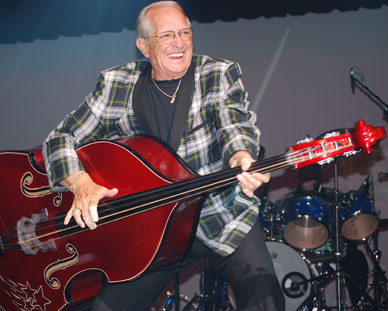
Marshall Lytle
voc, b, 1933-2013 US, Old Fort
Musician of Rock
Marshall Lytle (b. September 1, 1933, Old Fort, North Carolina, d. May 25, 2013), who also went by the name Tommy Page, was an American rock and roll musician, best known for his work with the groups Bill Haley & His Comets and The Jodimars in the 1950s. Lytle was a guitar player before joining Bill Haley's country music group, The Saddlemen, in 1951. But Lytle was hired to play double bass for the group, replacing departing musician Al Rex, so Haley taught Lytle the basics of slap bass playing. Lytle, who was only a teenager at the time, grew a moustache in order to look a little older, and became a full-time member of The Saddlemen and, in September 1952, he was with the group when they changed their name to Bill Haley & His Comets. Soon after, Lytle co-wrote with Haley the band's first national hit, "Crazy Man, Crazy" although he did not receive co-authorship credit for it (until 2002). Lytle played on all of Haley's recordings between mid-1951 and the summer of 1955, including the epochal "Rock Around the Clock" in 1954 ( Marshall and Ambrose are the last living members to play on the 1954 Rock Around The Clock masterpiece). He played a late 1940s model Epiphone B5 upright double bass, purchased in October, 1951, for about $275. He used gut strings for the G and D strings while the A and E strings were wound. Lytle's style of playing, which involved slapping the strings to make a percussive sound, is considered one of the signature sounds of early rock and roll and rockabilly. The athletic Lytle also developed a stage routine, along with saxophone player Joey Ambrose, that involved doing acrobatic stunts with the bass fiddle, including throwing it in the air and riding it like a horse. This became a signature performance for The Comets that later musicians working for Haley were instructed to emulate. In September 1955, Lytle, along with drummer Dick Richards and Ambrose, quit The Comets in a salary dispute and formed their own musical group, The Jodimars. Before leaving, Lytle and his colleagues offered to train their replacements in the art of rock and roll playing, Comets style. Lytle was succeeded by Al Rex—ironically, the same musician he had originally been hired to replace.
Instruments
Genres
Popular Tracks 

Track list and 30sec audio provided by ![]()
Band Members
Discography
| Title | Artist | Year | Type |
|---|---|---|---|
| Airmail Special | Marshall & The Shooting Stars, Marshall Lytle | 1994 | Album |
